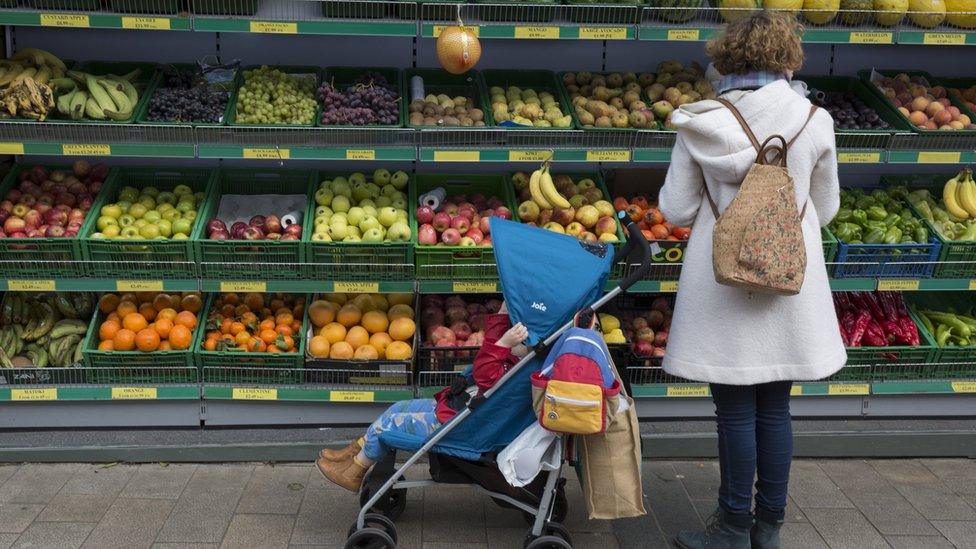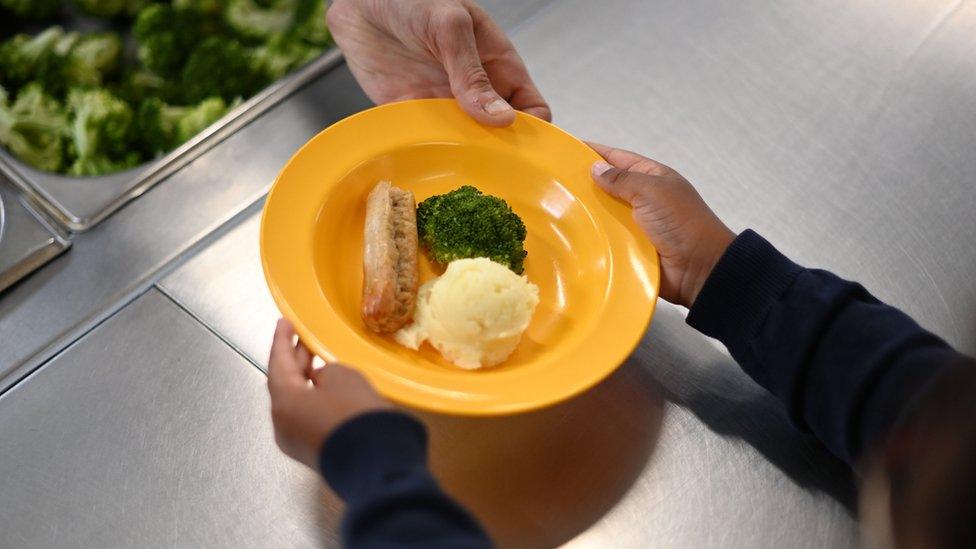MPs challenge value for money of meal vouchers
- Published
- comments

MPs wanted better protection for taxpayers' spending on the school vouchers contract
The Department for Education should have sought better value for money from a private contract for vouchers to replace free school meals in England during the pandemic, MPs have warned.
The Public Accounts Committee spending watchdog warned of "missed potential opportunities" for savings in the £425m deal with voucher firm Edenred.
MPs said the DfE seemed "surprisingly unconcerned" about the firm's profits.
But Edenred rejected "entirely any suggestion of profiteering".
A DfE statement also dismissed accusations of profiteering, adding: "In its investigation the National Audit Office acknowledged the rapid action this government took to deliver free school meals for eligible pupils, the significant improvements that were made to the scheme and our oversight of it."
A total of £380m worth of food vouchers were issued to disadvantaged families in England between March and August 2020, when children could not get free meals in school.
'Unacceptable delays'
But in the early stages, there were "serious problems" and "unacceptable delays" with the scheme, according to the Public Accounts Committee (PAC) report.

The vouchers replaced free meals when schools were closed
Both the DfE and Edenred took over a month to realise 40,000 order codes for conversion into vouchers had not been delivered to families, say MPs.
Edenred's website was also difficult to navigate and its systems failed to cope with the volume of calls and emails from families struggling to access the scheme.
Meanwhile, the DfE extended the contract with Edenred on two occasions, which was originally worth £78m, but did not seek to renegotiate any of the terms.
'Surprisingly unconcerned'
The DfE was "surprisingly unconcerned about whether Edenred was profiting from the voucher scheme at taxpayers' expense," said the report, "and missed potential opportunities to reduce the cost or share in the profits."
The Edenred voucher scheme was relaunched in January this year to provide vouchers worth £15 a week to disadvantaged children in England.
Meg Hillier, the committee's chairwoman, said: "Government's failure to learn from its repeated contracting mistakes, over and over, large and small, is costing this nation too dear.
"After the initial urgency we have seen the government continuing to play catch up on how to support families whose children are entitled to free school meals and despite the contract with Edenred growing more than five-fold there was no discussion about tendering the contract or even renegotiating it."
The Association of School and College Leaders' general secretary, Geoff Barton, called the service provided by Edenred "an absolute shambles", adding that "it adds insult to injury" to find out that opportunities to reduced costs were "missed".
"The DfE is constantly lecturing schools about the importance of running efficiently and saving costs wherever possible, but appears not to have brought the same rigour to bear on its own management of this scheme," said Mr Barton.
Edenred's profits from the scheme are not in the public domain but the DfE has previously said it's "very comfortable" with the money the French-owned company made.
One per cent of the contract's value has been handed back to the government as part of a rebate, according to a spokesman for the firm.

The government agreed a £425m contract with the voucher firm Edenred
The spokesman said: "With 95% of families saying [the scheme] has worked well for them and a contract which has ensured that every pound of public money was passed on to the children and families who needed it, with no charges to the DfE or the taxpayer, Edenred has delivered a programme which has provided vital support for families through the pandemic and value for money for the DfE."
However, the PAC report called on the government to learn lessons "to secure better value for the taxpayer" in the future.
'The scheme came up short'
The report also criticised the DfE's failure to hold Edenred to the terms of the contract, including a requirement that Edenred answer 90% of telephone enquiries within 30 seconds, which it failed to meet, with many calls unanswered.
It also said DfE should have done more to ensure supermarket chains taking part in the scheme were accessible to families, as early on almost 2,500 schools were more than 5km from a participating shop.
Alison Garnham, chief executive of the Child Poverty Action Group, said: "The scheme came up short not least because the Department for Education had insufficient understanding of the real-world needs of low income parents.
"We know that cash payments work best for families as they allow flexibility, safety and choice - and give parents confidence that they can reliably feed their children - since every shop takes cash and everyone knows how it works."
A DfE statement said: "We have already made further improvements to the scheme which take account of the recommendations in [the PAC] report, including improving the terms of the contract to ensure the better value for money for taxpayers."

LOCKDOWN LEARNING: Lesson support available on BBC Bitesize for every child, of every age, every day of the week
BITESIZE DAILY ON BBC IPLAYER: Help is at hand for your homeschooling needs
